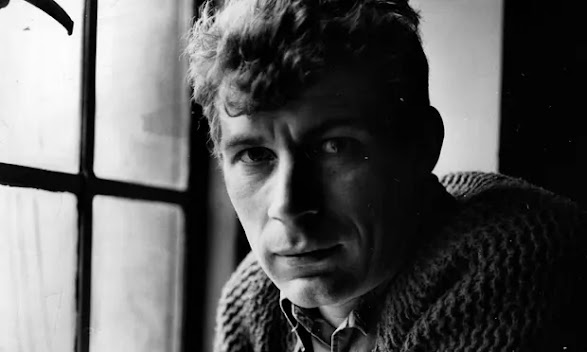Friday 6 January 2017
The only time I saw John Berger speak was at the 2015 British Library event. He clambered on to the stage, short, stocky, shy, his extraordinary hewn face topped with snowy curls. After each question he paused for a long time, tugging on his hair and writhing in his seat, physically wrestling with the demands of speech. It struck me then how rare it is to see a writer on stage actually thinking, and how glib and polished most speakers are. For Berger, thought was work, as taxing and rewarding as physical labour, a bringing of something real into the world. You have to strive and sweat; the act is urgent but might also fail.
He talked that evening about the need for hospitality. It was such a Bergerish notion. Hospitality: the friendly and generous reception and entertainment of guests, visitors or strangers, a word that shares its origin with hospital, a place to treat sick or injured people. This impetus towards kindness and care for the ill and strange, the vulnerable and dispossessed is everywhere in Berger’s work, the sprawling orchard of words he planted and tended over the decades.
In 1972 he won the Booker prize, and in his acceptance speech explained that he would be donating half his winnings to the Black Panthers. His closing words were “clarity is more important than money”. Few people have possessed such clarity, nor yoked it to such persistently generous political ends. Art he saw as a communal and vital possession, to be written about with sensual exactness.
His essays on painting are packed with unforgettable images, the diligent, inspired seeing of an artist who’d given himself over to written language. Vermeer’s rooms, “which the light fills like water in a tank”. Goya, whose cross-hatched tones gave “a human body the filthy implication of fur”. Bonnard’s “dissolving colours, making his subjects unattainable, nostalgic”. Pollock’s “great walls of silver, pink, new gold, pale blue nebulae seen through dense skeins of swift dark or light lines”. Art criticism is rarely this plain, this fruitful, or this adamant that what happens on a canvas has a bearing on our human lives.
Capitalism, he wrote in Ways of Seeing, “survives by forcing the majority to define their own interests as narrowly as possible”. It was narrowness he set himself against, the toxic impulse to wall in or wall off. Be kin to the strange, be open to difference, cross-pollinate freely. He put his faith in the people, the whole host of us.
Host: there’s another curious word, lurking at the root of both hospitality and hospital. It means both the person who offers hospitality, and the group, the flock, the horde. It has two origins: the Latin for stranger or enemy, and also for guest. It was Berger’s gift, I think, to see that this kind of perception or judgment is always a choice, and to make a case for kindness: for being humane, whatever the cost.



No comments:
Post a Comment